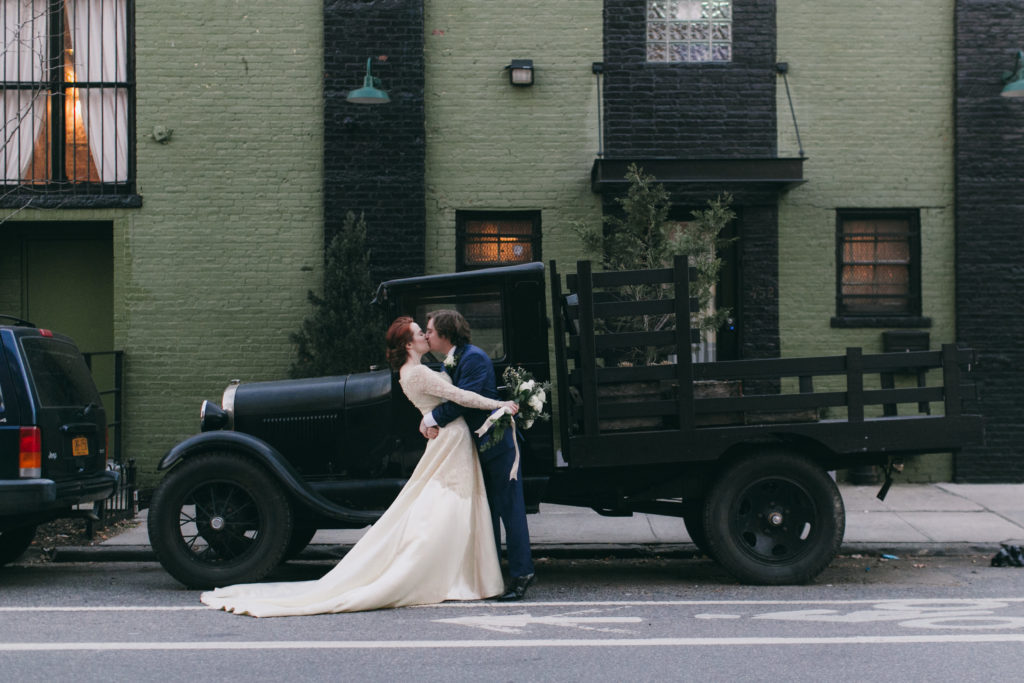For any wedding planner searching for a venue a decade ago, the cluster of old buildings on the corner of Union and Bond streets in Gowanus would be one of the least likely places to scout for locations. “There were hookers and squatters, it was a very, very rough area,” recalls Akiva Reich.
Today it’s the site of nearly constant, formal festivity, particularly weddings during the peak matrimonial months of June and September. Two of the formerly decrepit buildings across the street from one another, 501 Union and the The Green Building, form the nexus of Reich’s company, Gowanus Hospitality Group, one of Brooklyn’s leading providers of event spaces and services.
The Green Building’s high ceilings often inspire elaborate floral displays
Reich’s business, launched in 2010, has expanded in recent years to include a creative studio (Starling on Bond) and a boutique hotel (the Hasbrouck House) in upstate Stone Ridge. All told, the Gowanus Hospitality network includes eight businesses and 250 employees.
The company’s two main Gowanus buildings, which often turn up on lists of recommended Brooklyn wedding venues, offer prospective party hosts a choice of styles. The Green Building is more rustic, with exposed wooden beams and gilded chandeliers, paying tribute to an industrial past while conjuring an elegant atmosphere. Florists often decorate it with lush arrangements of white flowers. Across the street, 501 Union has skylights and more polished surfaces, a sophisticated look that’s often decorated with splashes of color.
Gowanus CEO Akiva Reich’s background is in design and architecture (Photo by Quyn Duong)
The venues have helped contribute to Union Street’s reputation as an entertainment mecca, now including the flagship of Ample Hills Creamery, the Royal Palms Shuffleboard Club, and the outdoor BBQ destination Pig Beach.
Gowanus CEO Reich is a lifelong Brooklynite–he and his wife and two children currently live in Carroll Gardens–whose family hails from Switzerland and Israel. His professional background is a mix of furniture design, architecture, building development, and historic restoration. All those influences stirred his curiosity about the once graffiti-covered Green Building at 452 Union St., built in 1889, with 6,000 sq. ft. of indoor and outdoor space.
“I saw the potential: it was an old brass foundry, in pretty rough condition. I started by converting the use of it,” says Reich. First he promoted it as a photo-shoot location. Then one of the cast members who had participated in a photo shoot wanted to get married there. “Sure, I don’t see a problem in it,” Reich recalls thinking. After the wedding, he started getting bombarded with requests from people interested in renting the space, which is how his journey into the hospitality business was launched.
Across the street from the Green Building, 501 Union offers a more sleek, contemporary setting
Given his background, Reich puts a lot of focus into the visual aspects of his event spaces. “It’s very important for me that there should be a very strong design element,” he says. “We’re living at a time where people are more knowledgeable, more design-inclined,” he says, noting that his target market, people in their mid 20s to mid 40s who often work in creative fields, is particularly sensitive about those elements.
His customers are similarly particular about the food. While Gowanus Hospitality has an in-house catering partner, Purslane, it’s not compulsory for Gowanus clients to use it. “The modern client is also a foodie,” Reich says. “Most people are very particular when it comes to what they want to eat. I do not want to change that. Financially,” he adds, “it would make sense for my catering company to be the sole provider to weddings at my venues, but it would alienate my target market.”
Another way Gowanus Hospitality operates differently from some other event companies is in renting to wedding parties for 24 hours at a time instead of a more limited slot for the event. “Why? Most venues were doing an eight- or 12-hour block, and every hour in addition was an extra $1,500,” says Reich.
The outdoor space’s backdrop at The Green Building reminds guests that they’re in Brooklyn
As he planned the rate schedule, an image in his mind was haunting him: seeing the bride take off her high heels, putting on sneakers, and packing boxes after the wedding. “Instead of being at a hotel enjoying their wedding night together, they’re packing boxes, clearing the venue because they could not stay there!”
The parties do have a curfew (around 2 a.m.) but the newlyweds can come back to the venue the next day and pack up their stuff with no rush. “There is no pressure, and it gives us the opportunity to meet [with] the client and have feedback on how their celebration played out,” says Reich.
The entrepreneur says he is always looking for new venues and has particular expectations. “Every building I look at has to have a very strong identity to begin with.” He is not tied to any specific neighborhood. “It has to be unique. If it’s unique, people are going to travel, that’s the bottom line. If it’s right, it’s right. That’s the foundation of how I go about anything.”
An extra treat for partygoers: a food truck brings desert to the garden space
As a designer, he likes to mix traditional and contemporary elements. “I can do very modern stuff,” he says, but usually his background as a restorer trumps any contemporary trends and fads. “I let the building talk to me,” he says. “That’s a starting point and then I put together a design process: How do I pay respect to the history of the building, how do I modernize it and make it into something very relevant to the future?”
With an exception or two, most of Reich’s restoration has happened in Brooklyn. “As a community person, there was a mission for me to do something in Brooklyn,” says Reich. He expects that pattern will continue. “Brooklyn is very dynamic and constantly changing.”
